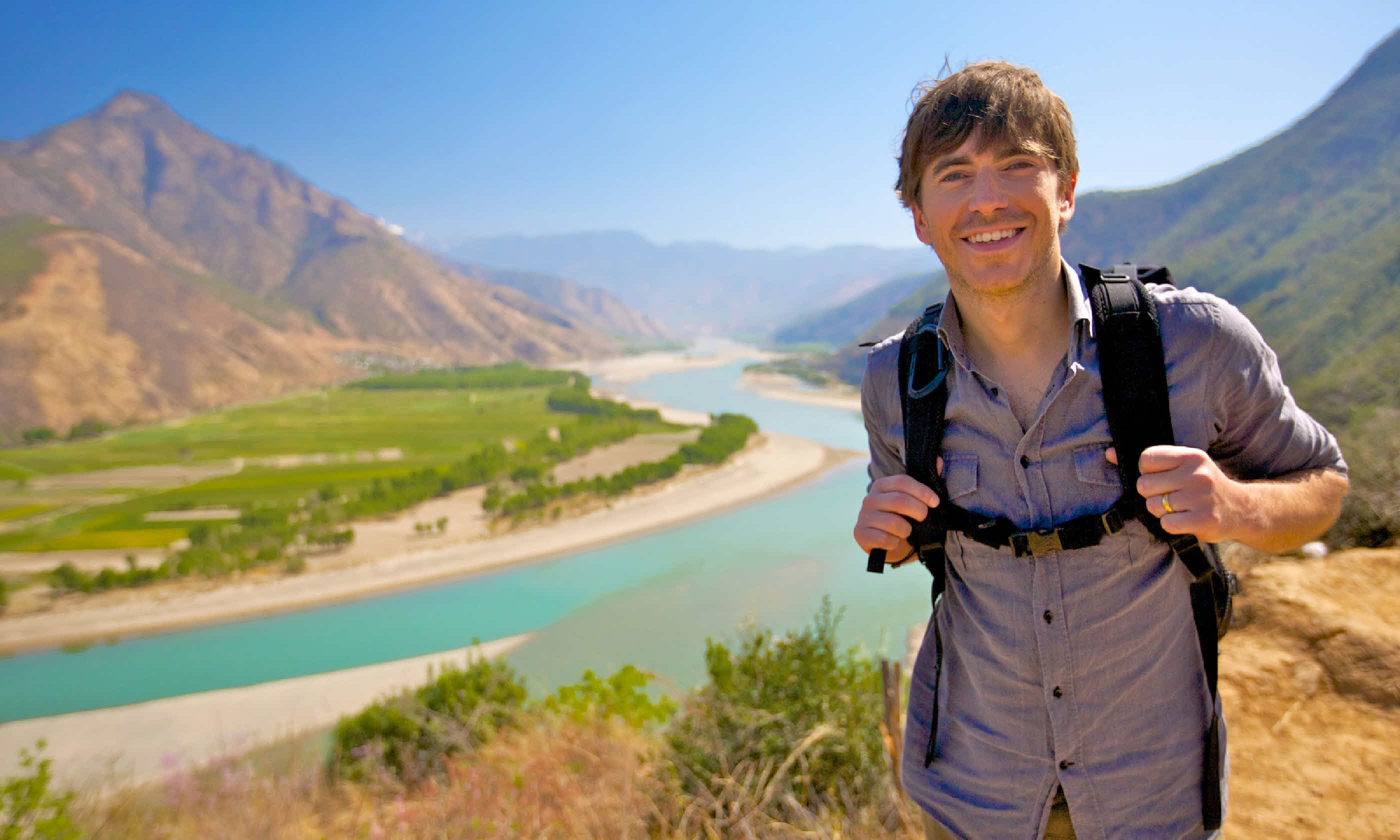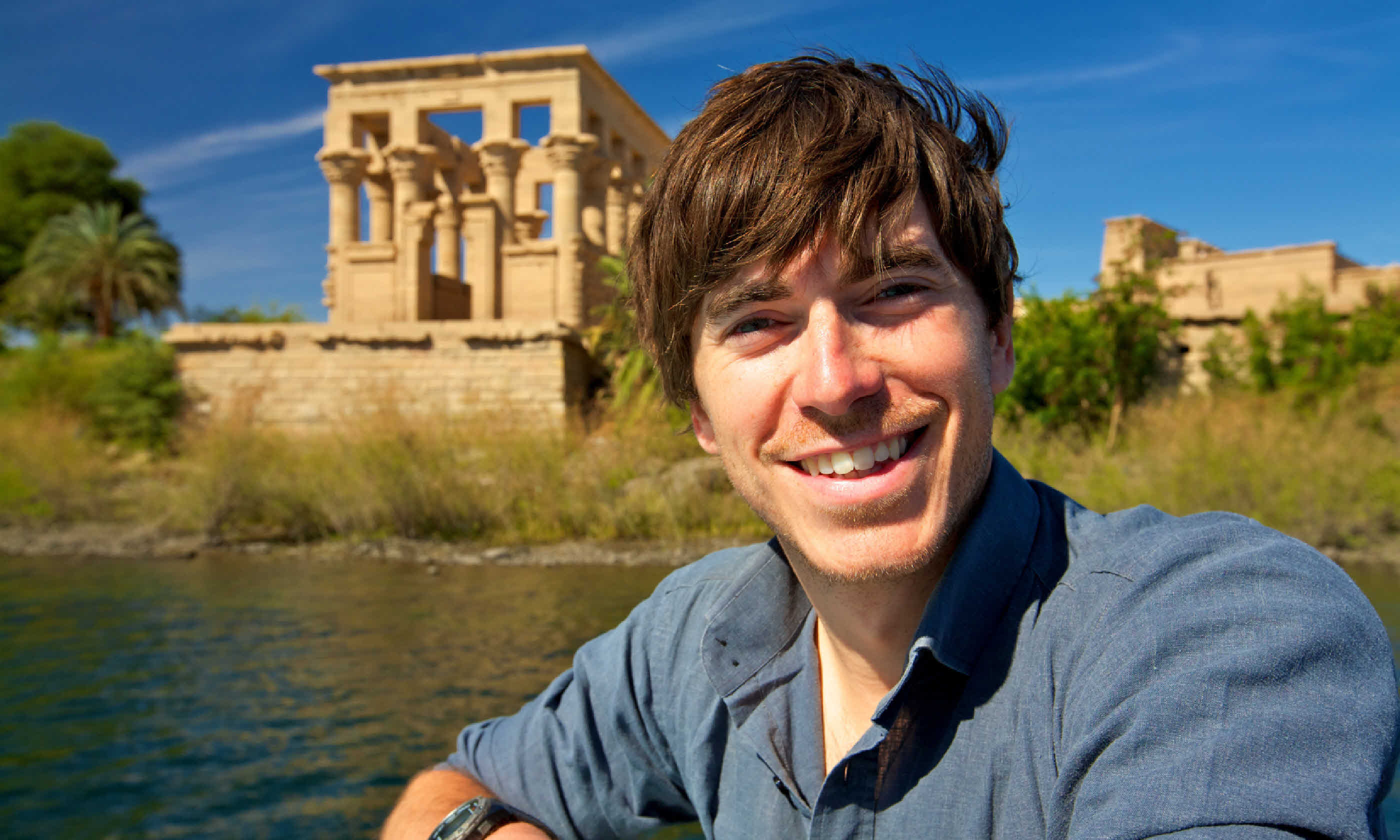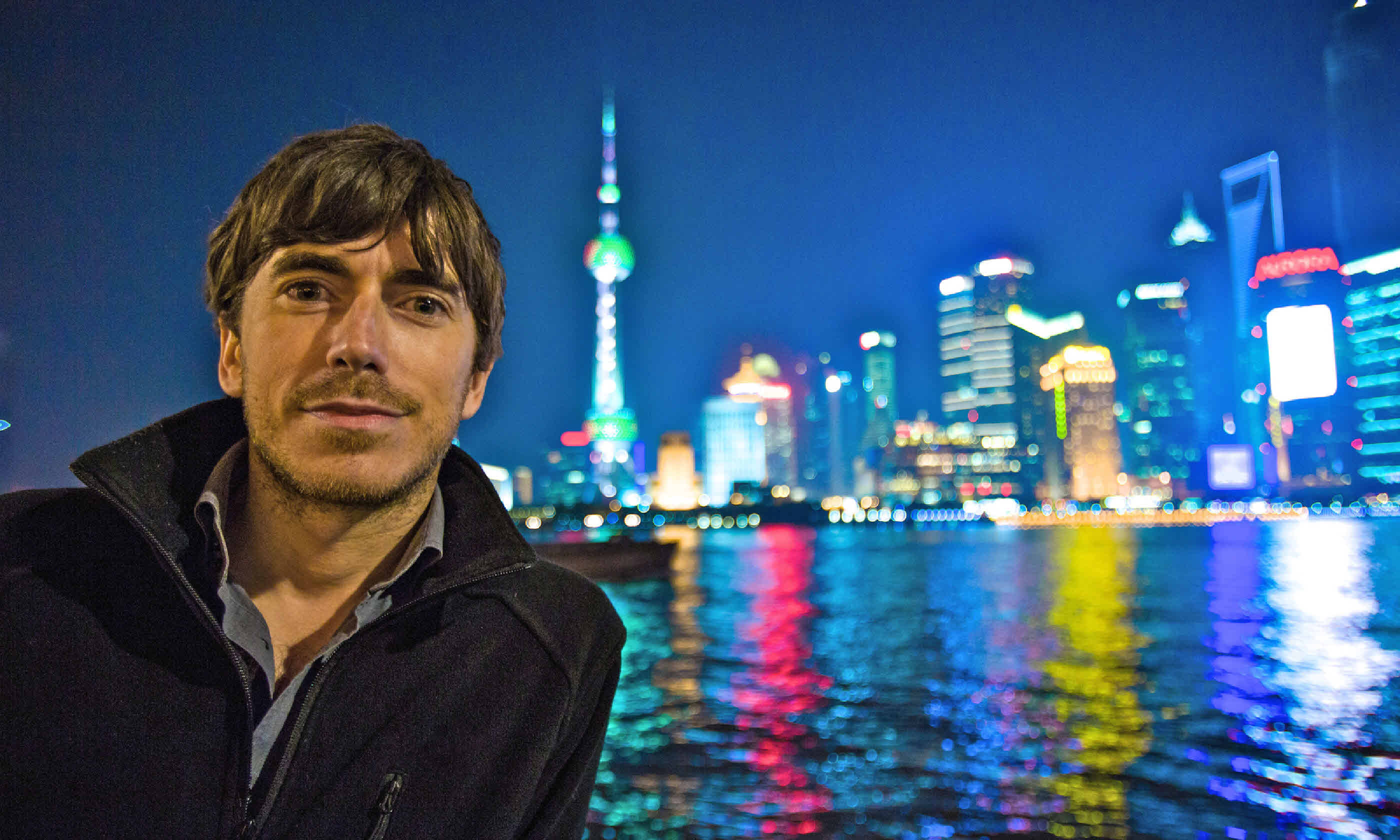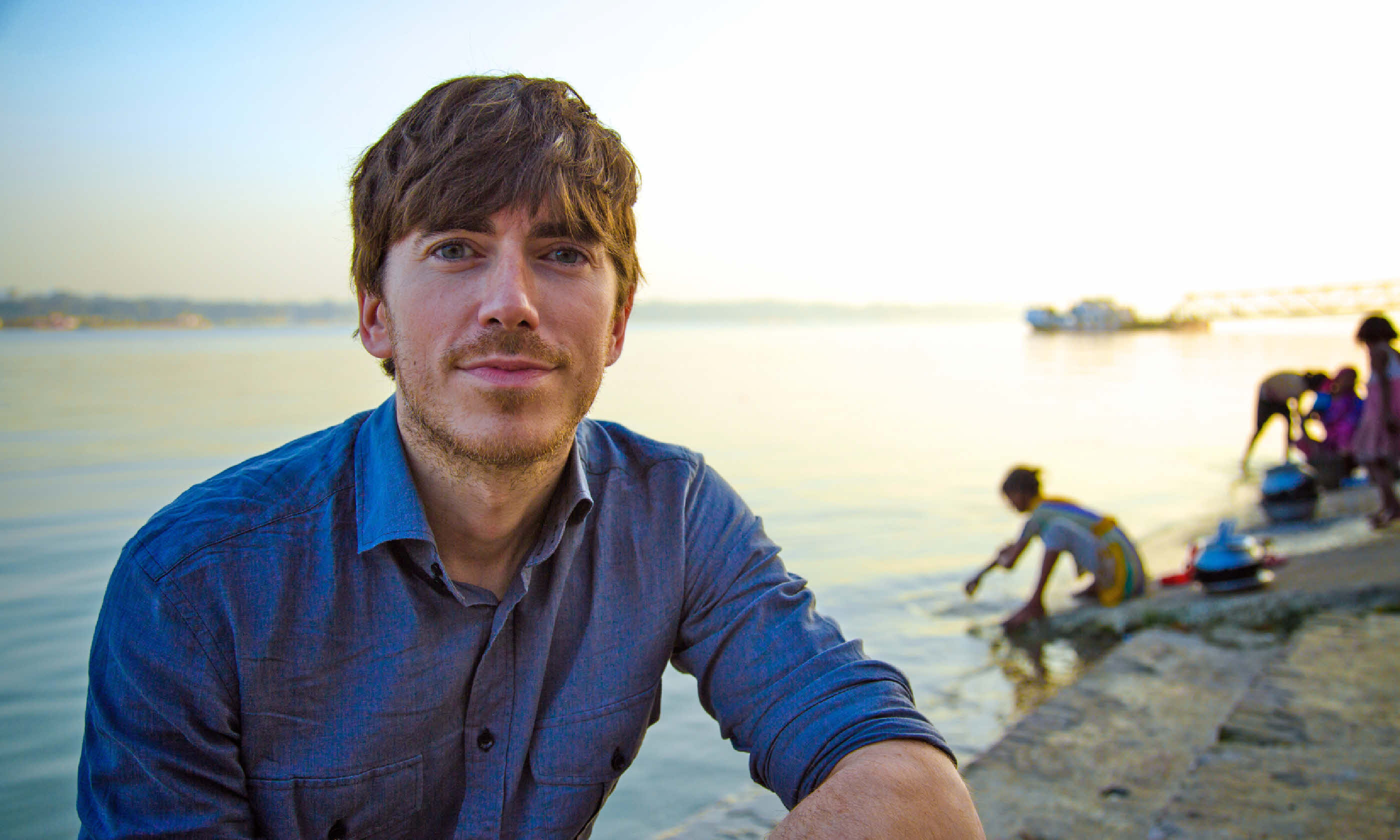
After filming BBC One's Sacred Rivers, presenter and adventurer Simon Reeve chats spiritualism, sustainability and the surprises to be found along the world's greatest waterways
How did the Sacred Rivers series come about?
It was the BBC's idea. It is a journey that encompasses some of the most extraordinary sights of human civilisation along the way – and there's a clear end to it: get to the sea, that's the end of the river, now it's time to go home. There is such a joy and a beauty to that.
The big surprise about these rivers for me, which is of course obvious when you think about it but you really don't fully appreciate it until you see it, is just how central they've been to the existence of human civilization, the development of human civilization, the survival of human civilization in each of these areas. They are life givers. We just take this for granted.
The series features three very different rivers. Take the Nile: it's almost synonymous with Egypt, isn't it? If we said said “Nile. What's the first word that comes to mind?” People would say “Egypt”.
Yes, people understandably associate one with another, and of course the reality is much different. Ancient Egyptians actually took the Nile for granted, it now transpires. There are far fewer references to the Nile in Egyptian historical record than you would imagine, given that it was everything. Without the Nile, Egypt, ancient and modern, could not exist. Egyptian civilisation developed along it. You would think it would be in every other sentence, but they just took it for granted.
Without the Nile, Egypt, ancient and modern, could not exist

Of course, now you have a situation where we know that most of the water in the Nile comes from Ethiopia, and Ethiopia has its own burgeoning and increasing population. So they're rather keen to utilise the river themselves: more people want it than currently have access to it. And no doubt there will be problems as a result.

On the Nile (Supplied: BBC Pictures)
Did you get to explore Ethiopia?
We only saw a fraction of it really. I wanted, since I was a kid, to go to Lalibela in northern Ethiopia and I was gutted we couldn't fit it into this. I think that shows that we couldn't do it despite my desperate pleas. We really do have to focus on what we need to tell the story. It's not just a jolly. Simon doesn't get to go wherever he bloody wants, unfortunately.
We didn't make it to Lalibela but hopefully next time. Do you know what Lalibela is? It's these 12 rock churches hewn out of solid rock. There are amazing myths and tales surrounding the Christian church in Ethiopia, which is ancient of course. Ethiopia's history is largely unknown in the outside world, which only really associates it with tragedy. It's a great shame, because it means that Ethiopia is missing out on some tourist dosh from people who could go and enjoy the culture there.
I think TV has a lot to answer for. Especially TV that ignores the reality of life in certain places and creates a picture of pristine wilderness and unspoilt people. That doesn't really exist anywhere now.
You ventured to Sudan, too, where there is still so much to be discovered...
Oh yes. Will they ever? Who knows. It's lovely to think there are mysteries still out there. That whole culture and civilisation has been largely forgotten and ignored. The pyramids in northern Sudan were jaw-dropping. It's an incredibly stark place actually. You get to indulge all your Lawrence of Arabia fantasies there with the wind blowing across this magical, mystical landscape. They are nothing like on the scale of the Egyptian pyramids but they are still very awe-inspiring.
Chinese cities now, they are Blade Runner cities. They have come so far

Did anywhere else stand out for you while filming this series?
I'm falling in love with everywhere I go. The big surprise for me on this series was China. I'd been to Beijing once before, 10 years ago, but this time we followed the Yangtze river. It takes you through the centre of Chinese civilisation. In the far west of China, near the city of Lijiang, there is a bend in the river. The river is flowing south out of China, essentially, and then by a quirk of geology it hits some hard limestone mountains that it hasn't been able to erode over hundreds of thousands of years – and so it does an abrupt turn and flows back across China. In doing so, it brings life to the country.

On the Yangtze (Supplied: BBC Pictures)
Sounds like you unearthed a few surprises along the way.
I think a lot of people, myself included, imagine that most of China has been levelled and turned into one giant factory but its not like that. There are still a lot of glorious sites to be discovered there. The country has come on so much further then I think people realise here. We still think they're rising, always behind us. But their cities now, they are Blade Runner cities. They have come so far. Where they go next will impact the future of all of us.
I wanted to understand what the Chinese believe in. Do they have any desire to search for more purpose and meaning than buying into the western dream of a new handbag and more shoes? Yes, I think they do. I don't think we give them enough credit for the spiritual side of Chinese life. It goes back to the dawn of their civilisation, which as we know is a bit older than ours.
As you explained, the Nile has traditionally been taken for granted. Is that also the case in China, or do they appreciate the Yangtze?
The Nakhi people, one of China's ethnic groups, worship the river in a very direct sense. We were even told that the mother of a person we met would never allow anyone to throw a stone into the river because she thought it would hurt the river's feelings. Many people are very closely linked to the river.
Traditional Chinese faiths put great store in the protection and preservation of nature and the natural world. Although China as an entity is leaping forward economically, in the people there is this sense that we've got to look after the world we are in – and that very much includes the Yangtze. I hope and pray that there is growing awareness in China to think of the future – not to just burn and screw the planet for the short-term gain.
I hope and pray that there is growing awareness in China to think of the future

Which how we perceive their attitude to be now? They are having a devastating effect on Africa...
Yes they are, although it is often to feed our own desires as much as their own. But yes it's an interesting point. Forests have been logged to provide wood for Chinese sawmills, even though that wood is often turned into parquet flooring and sold on to Europe or the USA. I feel more torn now than I have done in the past. I'd only seen it as little short of evil – now I see what the results have been for people in China. It has lifted hundreds of millions of human beings out of extreme poverty.
They are now getting a bit of something we have. We had a chance to show them a better way, but we didn't take it. They want a car and a fridge and a washing machine. If you're a Chinese peasant a thousand miles from the sea, you are not necessarily going to think about the consequences any more than people here do, frankly – whether that involves the mining of minerals in Africa or the chopping of trees in Indonesia.
Whatever else we accuse them of, there is this fundamental point: that they have lifted so many people out of extreme poverty. More than has ever been achieved anywhere else. The fundamental issue that we face in this world is how to do this without screwing the planet – and there isn't really a solution to that. I'm personally very torn about it; I don't like seeing poverty, but I know we've got to keep the world for the future.
Were you able to discuss these sorts of issues with people in China?
Not enough. It's not a free country of course. I think there is a growing awareness that they've got to start thinking long-term again, which is what the Chinese always did [before] communism. The history of communism in China is a short period in its timeline – hopefully they will revert back to thinking in a long-term way that promotes a more sustainable approach to life. There's a lot of them, and their power to affect the course of our planet is unprecedented. The path they take will impact the future of us all, but I think there is a desire to live a clean, contented, healthy life.

On the Ganges (Supplied: BBC Pictures)
I was intrigued when you say at the beginning of the programme on India that you've never had a very happy relationship with the country. What's that about?
I have a difficult relationship with India because of the immense, intense poverty there. I think a lot of us have got hung up on a belief that India is a very spiritual place with people who, although very poor, are very in touch with their beliefs and spiritualism. I think it's a patronising view and quite demeaning. It can excuse, to a certain degree, the ongoing poverty there.
Poverty is not romantic. Poverty is awful and hard, and if it can be stopped then it should be. India has a space programme, but I've walked into villages there that have no contact with the modern world, where the state is completely absent and people are making a wooden plough by hand.
So yes, I've got difficult feelings about India. Yet following the river, the living goddess Ganges, was a chance to see that side of India that people make a fuss about – and I can see why they do! Because it's spectacular and romantic and life-affirming and colourful and extreme. People praying to the river, people making offerings to the river, and people's bodies being burnt next to it. It's an amazing place, you know.
Varanasi is one of the holiest places in India. A place to where people will trek carrying the body of a dead friend to burn next to the river because they believe in moksha, or release. Dozens of bodies being burnt on the ghats next to the river. The smell of burning human flesh in the air, in your nostrils. You can't get it out of your clothes. It's horrible but it's amazing.
How do you settle back home after being to all these places and having these experiences?
It used to be hard because it used to be abnormal – and then gradually I realised it's my job. I enjoy the everyday experiences at home, and perhaps cherish them a bit more than someone who hasn't seen villagers making a wooden plough by hand would do.
Also, these trips are telly trips – they're not six months away when you sort of forget a little bit of where you're from. These are just short, intense journeys where we are going for work and so we are quite focused on what we have to do.
After we filmed Tropic of Cancer, a six month trip where we did some pretty dangerous and extreme stuff, I came back and had to rod out the sewers at home before we'd even unpacked our bags. Back to the shite of life! It was just before Christmas and it was such a come down, but it was completely appropriate really because that is life for god's sake. It makes you much more aware of how lucky you are.
The only thing I struggle with slightly is a bit of depression, occasional tears into pillows

Are you ever haunted by some of the more harrowing sights?
The only thing I struggle with slightly is a bit of depression, occasional tears into pillows. You have to have a heart of stone not to be affected by some things. Even on this series... you can't avoid life as it's lived it remote parts of Sudan where people are begging desperately by the side of dirt tracks for a sip of water, or the endless suffering of poor street kids in India. That's been very tough. If I was there longer I might have had more of a chance to help.
There are worse gigs in life. European volunteer nurses discovering the heartbreak of working in feeding stations in a famine-hit part of Africa, for example. Who have never really left home before and have one bit of peanut food substitute to share between two dying children. This is just telly. So, basically, it's easy to fit back in. But it's good that we are going there to do something – we have our little mission and it is designed to make the world a tiny bit better as a result.
What are you working on next?
A series about the Caribbean. Basically we are going around the Caribbean sea which means we get to do the mainland coast as well. So it means Venezuela, Colombia and you've got dozens of islands... We start the first journey in a month. There were major planning sessions last week. Big maps. How long to get from there to there? How much is it to get from there to there? We're going to start on Hispaniola. No doubt we will annoy people by missing their home island or their favourite island, but that's telly. It's not a guide book. We do the best we can.